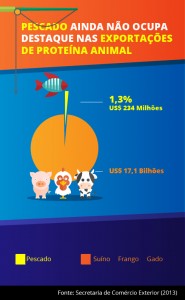For every 200 Brazilians, one is a fisherman.” The message is part of the video released by the Ministry of Fisheries, this Monday (29/06), National Fishermen’s Day.
Brazil currently has 1.084 million fishermen who contribute to the annual production of 765 thousand tons (2013) of fish. To mark the day of this professional, celebrated this Monday, June 29, the Ministry of Fisheries and Aquaculture launches a video on official Facebook page of the organization and hashtag #SerFishermanIs on twitter.
Brazilian production could be even higher. According to the ministry, the current loss is between 20% and 25% due to poor storage due to the fleet's outdated technology (40%). Currently, Brazil contributes around 8% of production in the Atlantic Ocean, but the government intends to reach 15%.
To this end, the Ministry of Fisheries is investing in improving management processes and increasing the profitability of stocks, eliminating waste and improving the infrastructure for unloading fish. The government's aim is to increase fishing production from 765,000 tons/year to 1 million tons/year by 2020 and Aquaculture from 707,000 tons/year to 2 million tons/year in the same period.
Brazil is promoting the establishment of Permanent Management Committees (CPG) to propose measures and actions inherent to foster sustainable fishing. 12 CPGs have already been established for the marine environment, including lobster and tuna species, demersal species (covina, red snapper and hake), shrimp and pelagic species, in the North, Northeast, South and Southeast regions, and for the continental environment, related to the main basins.
The MPA is also cross-referencing information from federal government databases to identify fishermen, helping to classify fishermen into the Exclusive, Main and Subsidiary categories. This will allow the ministry to determine which fishermen are entitled to Seguro-Defeso (a benefit paid during the period in which fishing is suspended for the reproduction of species).
To professionalize these workers, Pronatec Fishing and Aquaculture courses are being implemented to teach fishermen how to add value to the product, make use of fish byproducts, improve the results of fish farming, and increase awareness of navigation safety, among other things. There is also a partnership between the Pescando Letras Program and the Brasil Alfabetizado Program.
To guarantee fishermen's rights, the Ministry of Fisheries is issuing the Professional Artisanal Fishermen's Registry (RGP) throughout the country. The licenses are known as the fisherman's card and are essential to qualifying them for access to federal government social programs, such as access to boat fuel at a lower price, with the Diesel Oil Economic Subsidy Program, and through other programs, such as Minha Casa Minha Vida. Since the beginning of the year, more than 24,000 licenses have been issued in all Brazilian states.
The fishing infrastructure is being improved. The Tapanã Public Fishing Terminal (TPP) in Belém (PA), for example, is being built to be a fishing depot in coastal and riverside areas. The terminal has a total area of 32,000 square meters and can receive 250 tons of fish per day, in addition to a port with capacity for 25 small and medium-sized vessels. Approximately R$1.4T 33 million is being invested. In addition to Belém, the reopening of the Cabedelo TPP (PB), the renovation and equipment of the Santos and Cananeia TPPs (SP) and the activation of the Niterói TPP (RJ) are planned.
